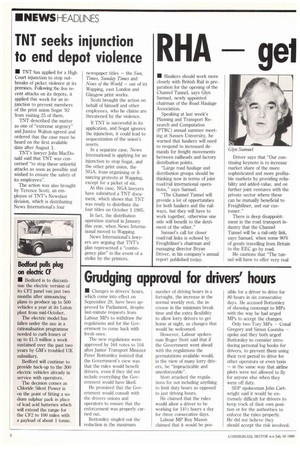Grudging approval for drivers' hours
Page 6

If you've noticed an error in this article please click here to report it so we can fix it.
• Changes in drivers' hours, which come into effect on September 29, have been approved by Parliament, despite last-minute requests from Labour MPs to withdraw the regulations and for the Government to come back with fresh ones.
The new regulations were approved by 164 votes to 104 after Junior Transport Minister Peter Bottomley insisted that the Government's view was that the rules would benefit drivers, even if they did not include everything the Government would have liked.
He promised that the Government would consult with the drivers unions and operators to ensure that the enforcement was properly carried out.
Bottomley singled out the reduction in the maximum number of driving hours in a fortnight, the increase in the normal weekly rest, the increase in the minimum break time and the extra flexibility to allow lorry drivers to get home at night, as changes that would be welcomed.
However, Labour spokesman Roger Stott said that if the Government went ahead with the regulations the permutations available would, in the view of many lorry drivers, be "impracticable and unenforceable".
Stott attacked the regulations for not including anything to limit duty hours as opposed to just driving hours.
He claimed that the rules would allow a driver to be working for 141/2 hours a day for three consecutive days.
Labour MP Roy Mason claimed that it would be pos sible for a driver to drive for 80 hours in six consecutive days. He accused Bottomley of showing contempt to MPs with the way he had urged MPs to accept the changes.
Only two Tory MPs — Conal Gregory and Simon Coombs — spoke and they both urged Bottomley to consider introducing personal log books for drivers, to prevent them using their rest period to drive for other operators or even taxis — in the same way that airline pilots were not allowed to fly for anyone else when they were off duty.
SDP spokesman John Cartwright said it would be extremely difficult for drivers to keep track of their own position or for the authorities to enforce the rules properly. He did not believe they should accept the risk involved.




















































































































